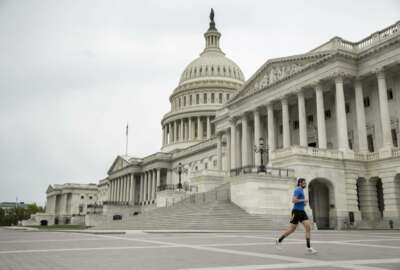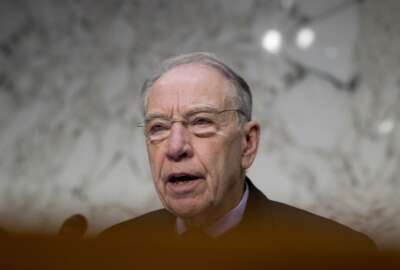
New coronavirus stimulus oversight chief confirmed, now what?
The Special Inspector General for Pandemic Response Brian Miller was confirmed by the Senate last week -- so now we wait and see.
Best listening experience is on Chrome, Firefox or Safari. Subscribe to Federal Drive’s daily audio interviews on Apple Podcasts or PodcastOne.
When Congress passed and the president signed the CARES Act, it dropped more than $1 trillion into the economy. If that was like an earthquake, now it’s time for the aftershocks as oversight of that spending gets underway. The Special Inspector General for Pandemic Response Brian Miller was confirmed by the Senate last week. With some perspective on what to expect, Federal Drive with Tom Temin turned to two partners at the law firm Seward & Kissel LLP. Michael Considine is a former supervisory federal prosecutor, and Robert Kurucza is formerly with the Office of the Comptroller of the Currency and of the Securities and Exchange Commission.
Interview transcript:
Tom Temin: First, we have Michael Considine former supervisory federal prosecutor. Mr. Considine. Good to have you on.
Michael Considine: It’s good to be with you, Tom.
Tom Temin: And Robert Kurucza is formerly with the Office of the Comptroller of the Currency and of the SEC, Bob, good to have you on.
Robert Kurucza: Good to be with you as well.
Tom Temin: Alright, Brian Miller has a big job ahead. And I don’t know how you oversee a trillion dollars that was spent in nine weeks. How would you characterize the first thing he’s got to do once he has settled into the office?
Michael Considine: Well, his first order of business I think, is to address how he’s going to interface with you know, the various constituents that he’s working with, for example, there’s a congressional oversight committee, as you know, which has been appointed to be involved in this process of overseeing the expenditures. And it does a pandemic response accountability committee, which is comprised of 21 Inspector Generals chaired by I think Mr. Glenn Fine, who was the inspector general at the Department of Defense. So just coordinating his activities, making sure they’re not stepping on each other and operating in an efficient and thorough fashion sounds to me like one of his first tasks, along with obviously ensuring that he has the appropriate team to assist him in that office.
Tom Temin: Sure. And Bob, of course, this is a little different than say the relief spending that happened in the financial collapse 12 years ago, because it was easier to count the entities that the money went to and how it was used. Here, it went to thousands and thousands, much or anyone knows how many places. What are the difficulties in overseeing all of that.
Robert Kurucza: Well, Tom, you’re exactly right on that point. Again, I I think there were a lot of lessons learned from the financial crisis that proved beneficial in connection with the COVID-19 crisis. However, it’s a much more in my judgment, it’s a much more complicated mosaic, as you point out, you know, trillions of dollars have been involved. Again, it happened very quickly. The stimulus had to hit the market very rapidly, whether it was a PPP program, whether it was coronavirus, and we represent a number of both public and private parties that have been involved one way or another in connection with this. The requirements are complicated. The procedures for accounting for expenditures, eligibility requirements, in some cases are difficult to concern. But again, the speed the warp speed that this went out with, which quite frankly, I think is attributed to Treasury and the other agencies was not perfect, but given the time constraints that was faced it’s quite impressive, but nonetheless very complicated — and in terms from an enforcement perspective, or compliance perspective for the recipients of the money, it’s one that has a lot of issues that need to be paid attention to.
Tom Temin: Sure. And now this money did go to some large and some traded companies, and you would presume they have good regulatory and compliance processes in place. But it also went to thousands and thousands of mom and pop places and small companies. So does the best place to begin looking at things start with those that received the money? Or does it start with the processes of the agencies responsible for dispersing it, as you say, Treasury, and the Small Business Administration or two, I think that come to mind.
Robert Kurucza: Well, maybe I can jump in and Mike can add to it as as you see fit. Again, you have to look at a number of programs with PPP, for example, much of the money, quite frankly, close to all of the money has been already dispersed. Same thing is true for example of the coronavirus where the grants were made, it was basically done on poppy relation to the states and other political subdivisions. So in many cases, not all the money has already been dispensed. So you have, Tom, as I think you were alluding to, given that one of the key elements of the purposes of these programs was to get the stimulus out into the marketplace very quickly, we have a situation where, again, the front end enforcement mechanisms, for example, you referenced SBA, will typically when one goes to apply for an SBA loan, like any other loan, you’re going to have to file an application, you’re going to have to provide financial information, you’re gonna have to provide other information and wait to see whether it’s granted. In this case, the grants were made largely on certifications. So what that means is the enforcement mechanism from a compliance standpoint will come after the fact. So as much heavier emphasis I think on terms of after the fact and that, quite frankly, looking at that, whether it’s gonna be on a sampling basis, by the agencies, you know, etc. And looking at, you know, as you also point out, there were multimillion dollar grants here, other cases, it may be literally $10,000 to a very small business that received a grant. And whether it becomes what was a loan initially becomes eligible to be a grant that is forgiven. You know, these are all requirements. And so the enforcement mechanisms here were largely after the fact.
Tom Temin: Sure, Mike, anything to add.
Michael Considine: Right now, we’ve seen some prosecutions already in early May. There were prosecutions in Rhode Island, also in the state of Washington, with recipients of funds under the Paycheck Protection Program, commonly known as PPP, have been prosecuted for falsifying applications and the like. So I think as Bob said, a lot of is going to be in the back end, but I will point out that the Treasury has issued FAQs and alike in an effort to give some guidance, you know, add some clarity to some of the language that was confusing in terms of eligibility and like
Tom Temin: And do you feel that Brian Miller, you know, based on your federal experience and having worked in federal offices, will he have adequate systems, literally information technology systems and data available to be effective in this because when it comes to disbursements of grants and funds, and to counting the dollars and contractors, it can get pretty tangled?
Robert Kurucza: It’s a good question, Tom, that would be one of his first steps to assess, you know, what he has available. The Office has a $25 million appropriation, and I’m sure he’ll be looking at those dollars and using them in the right fashion and to the extent that what he has in place is inappropriate, would probably reach out to try and get, you know, vendors in the light to provide him with assistance. But as you pointed out earlier, you know, Mr. Miller has been around the block before in addition to having been a federal project He was also an IV. So I think he knows his way around the space. I don’t know him personally, but it’s not as if he’s an appointee who comes with no experience being a federal prosecutor in Eastern District of Virginia and then being an inspector general gives you some background to assume this requirement and, you know, tackle these tasks.
Tom Temin: Sure, and Mike is a prosecutor. How does someone like Brian Miller, how does his office make a decision on when to simply say, you know, well, this was wrong, but we have to kind of let it go or maybe ask for the money back versus when do you prosecute? Is there a dollar threshold that makes it worthwhile?
Michael Considine: There’s a number of factors that federal prosecutors consider in recommending charges to be filed. And you know, they do include dollar amounts for sure. There’s also a deterrent value. So even if the dollar amount is small, but if the activity was improper and can be proven in court beyond a reasonable doubt, then prosecutors will bring charges forward in any event, so it’s not just dollar amount, but there’s a number of factors including deterrence, letting the public know that we’re out there watching these funds and bring people who abuse those funds to justice. Depends on the number of cases they have, the resources they have. Unfortunately, for federal prosecutors these days, you cannot always bring every case you’d like to given resources. So you have to prioritize and make a determination, which is the best case to file.
Tom Temin: But you could imagine a scenario where say, I don’t know I’m making this up, a chain of bakeries that constitutes a small business took loans for all of the bakeries, and then the guy bought a Maybach in this driving around and didn’t hire anybody back. That’s the kind of thing that could result in prosecution, even though it’s a relatively small potatoes affair.
Michael Considine: Yes. And in fact, some prosecutions along the lines you’re describing have already occurred. Some of the ones I just mentioned earlier, had been you know, relatively small amounts of money. I believe that one in Washington was just a little bit more than a million. So you’re right, they will be bringing cases, even if the dollar amounts are relatively small to the extent that the facts support a prosecution. And the other thing to point out is there’s a lot of collaboration going on between and among the SBA, FDIC, the FBI, IRS, in a lot of these cases, some of these agencies are collaborating and providing information to assist the government in bringing these criminal charges.
Tom Temin: And Bob, how long do you think this will take? I mean, the Special Inspector General for Afghanistan reconstruction is still going. I don’t know whether the TARP people are still going or not, but these things tend to have a long tail. Can this be wrapped up with a period at some point?
Robert Kurucza: Well, you mentioned TARP, and TARP there are facets of it still going on. So we anticipate that this also will have a long tail to it. And again, coming back and maybe just amplifying a little bit on the point that was just being discussed, again, coming back that over $2 trillion have been dispersed at this point in time, there’s going to have to be a sampling of what is it. So whether it’s deterrent. Again, you have such a wide range of, you know, either public, you know, governments that have received money in the case of coronavirus or PPP, which ranges from the smallest of businesses to some, you know, rather large in some cases, public businesses or regulated businesses in some cases, which will have other implications, collateral implications in terms of their compliance issues, there’s going to have to be a sampling of this, and cases that are brought from, I use this term advisedly, you know, regulation by enforcement, where they’re going to be examples. Again, we’ll have that deterrent effect that Mike indicated. And that’s going to be the purpose because they’re not going to be able to pursue the full gamut of the cases that are out there. There’s going to have to be that prioritization very selectively, at least in my view, in terms of doing this given the magnitude of what is involved in. So I think Mr. Miller has a bit of a Herculean task before him together with the rest of compliance enforcement complement that has been assembled in other areas. But it’s one that given his background, I think he’s a terrific selection for the position.
Tom Temin: Robert Kurucza is formerly with the Office of the Comptroller of the Currency and of the SEC. Thanks for joining me.
Robert Kurucza: You’re quite welcome.
Tom Temin: And Michael Considine is a former supervisory federal prosecutor. Thank you also.
Michael Considine: Thanks for having us, Tom.
Copyright © 2025 Federal News Network. All rights reserved. This website is not intended for users located within the European Economic Area.
Tom Temin is host of the Federal Drive and has been providing insight on federal technology and management issues for more than 30 years.
Follow @tteminWFED
Related Stories

Pandemic board launches spending tracker, but with little for oversight groups to parse




